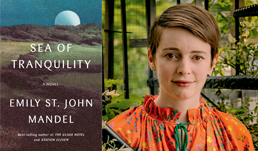- Categories:
A Q&A With Emily St. John Mandel, Author of April Indie Next List Top Pick "Sea of Tranquility" [2]
- By Emily Behnke [3]
 Independent booksellers across the country have chosen Emily St. John Mandel’s Sea of Tranquility (Knopf) as their top pick for the April 2022 Indie Next List [4].
Independent booksellers across the country have chosen Emily St. John Mandel’s Sea of Tranquility (Knopf) as their top pick for the April 2022 Indie Next List [4].
Sea of Tranquility follows a cast of seemingly disparate characters on a journey that begins on Vancouver Island in 1912 and ends on a dark colony on the moon five-hundred years later.
“A gem of a novel, spiraling out of place and time to shape our present hopes and anxieties into a story of peace and resilience,” said Dan Brewster of Prologue Bookshop [5] in Columbus, Ohio. ”Mandel weaves effortlessly between historical and science fiction and is a master of immersive storytelling.”
Here, Bookselling This Week talked about writing the book with Mandel.
Bookselling This Week: How did the idea for this story come to you?
Emily St. John Mandel: I’d been working on autofiction for a while, just as an experiment. I wasn’t sure I’d do anything with it — it seemed like the sort of thing that might be the seed of a new book but then not end up being part of the final version, which isn’t that unusual for me in starting a new book. At the same time, I’d been thinking about writing a time travel story.
Then the pandemic hit, and I wanted to write about it but not too directly, because the lived experience was unbearable, so I decided to write about it through a sci-fi lens.
Time travel narratives tend to fall apart under close scrutiny, but it seemed to me that if I were to add the simulation hypothesis, that might be a way to make it work. Having a character say “we’re not sure why time travel works as well as it does, because it seems to us that sending someone back in time should always create a closed loop and yet somehow it doesn’t” was a way to make it work.
BTW: Like some of your other work, this book navigates multiple timelines: we explore North America two centuries ago, in 2020, and centuries into the future. What drew you to these time periods? Why structure a novel in this way?
EM: The structure of this novel was based on David Mitchell’s Cloud Atlas, which is one of my favourite books. I admire the symmetry of the structure, and the vast scope of time, from distant past to distant future, and I wanted to see if I could structure a novel in the same way, with a similar sense of scale.
BTW: What was the experience of writing this book like for you?
EM: This novel was something like a refuge for me. I wrote it almost entirely during 2020. I live a mile from a hospital in New York City, so for the first several months of the pandemic there was a backdrop of constant sirens, all day and all night. There was a week in April when seven-hundred people died every day in my city. So it was an atmosphere of death and calamity, and it meant a lot to me to have this project I could immerse myself in. It was something to focus on aside from the nightmare we were living in.
BTW: What made you want to return to the cast of The Glass Hotel?
EM: I like those characters and wanted to spend more time with them.
BTW: Reading the author Olive Llewellyn’s sections, I couldn’t help but notice parallels to your own work — Marienbad feels similar to Station Eleven, for example, and you’ve spoken about requests for op-eds [6] in the weeks directly following lockdown, something Olive also deals with. What were your intentions in writing Olive’s character?
EM: I wanted to write about the experience I was having in the early months of the pandemic as the author of Station Eleven, and I also wanted to write about the experience of the marathon promotional book tour.
BTW: This book, like Station Eleven, also incorporates genre elements. Does anything in particular inspire the exploration of sci-fi in your work?
EM: I’ve just always loved the genre. There was a long period in my late teens when I only read sci-fi. My reading preferences have expanded since then, but I still think of it as the genre where you get to go to the furthest limits of imagination.
BTW: Is there any one thing you’d want readers to take away from this book?
EM: No. An idea I really like is that ten readers might read one of my books and come away with ten different ideas of what the book was about. I don’t write books with a single take-away message in mind.
BTW: What role do indie bookstores play in your life?
EM: Independent bookstores are among my favourite places in any given city and I love visiting bookstores when I’m traveling. It’s just such a pleasure to spend time in those spaces. My first three novels were published by a very small press, and I’ll never forget how independent booksellers championed those books and am forever grateful for the support that has continued throughout my career.
BTW: Can you tell readers what you’re working on next?
EM: I’m working on a new novel. I’m also writing a screenplay with a friend of mine — it’s a noir adaptation of my first novel, Last Night in Montreal.